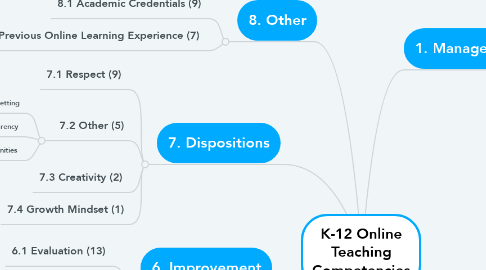K-12 Online Teaching Competencies
by Emily Pulham


1. 5. Technology
1.1. 5.1 General Technology (28)
1.2. 5.2 Troubleshooting (8)
1.3. 5.3 Software Use and Management (6)
1.4. 5.4 Learning Management System (6)
2. 3. Assessment
2.1. 3.1 General Assessment (25)
2.2. 3.2 Data Use (15)
2.3. 3.3 Timely Feedback (14)
2.4. 3.4 Authentic Assessment (9)
2.5. 3.5 Student Self-Assessment (8)
2.6. 3.6 Student Readiness (8)
2.7. 3.7 Review Student Progress (6)
2.8. 3.8 Formative Assessment (3)
3. 7. Dispositions
3.1. 7.1 Respect (9)
3.2. 7.2 Other (5)
3.2.1. goal setting
3.2.2. transparency
3.2.3. committed to school opportunities
3.3. 7.3 Creativity (2)
3.4. 7.4 Growth Mindset (1)
4. 6. Improvement
4.1. 6.1 Evaluation (13)
4.2. 6.2 Reflection (5)
5. 4. Instructional Design
5.1. 4.1 General Instructional Design (33)
5.2. 4.2 Curating Online Learning Activities (14)
5.3. 4.3 Universal Design & Access (14)
5.4. 4.4 Diverse Curriculum Activities (7)
6. 8. Other
6.1. 8.1 Academic Credentials (9)
6.2. 8.2 Previous Online Learning Experience (7)
7. 1. Management
7.1. 1.1 Legal and Ethical Issues (32)
7.1.1. copyright
7.1.2. privacy
7.1.3. academic honesty
7.1.4. internet safety
7.2. 1.2 Communication (30)
7.2.1. multi-modal communication
7.2.2. online interactions
7.3. 1.3 Establish Expectations (28)
7.4. 1.4 Classroom Management (24)
7.4.1. behavior monitoring
7.4.2. discipline
7.5. 1.5 Online Content Management (17)
7.6. 1.6 Collaborative Teaching (17)
7.7. 1.7 Professional Responsibility (11)
7.8. 1.8 General Management (9)
7.9. 1.9 Parental Involvement (8)
7.10. 1.10 Time Management (7)
7.10.1. scheduling options
7.10.2. planning time
8. 2. Pedagogy
8.1. 2.1 Flexibility & Personalization (43)
8.1.1. pacing
8.1.2. scheduling
8.1.3. learning styles
8.1.4. curriculum
8.2. 2.2 Student Collaboration (23)
8.3. 2.3 Content Knowledge (17)
8.4. 2.4 General Pedagogy (16)
8.5. 2.5 Online Discussion Facilitation (14)
8.6. 2.6 Supporting Students (11)
8.7. 2.7 Student-Centered Learning (10)
8.7.1. independent learning
8.7.2. student ownership

